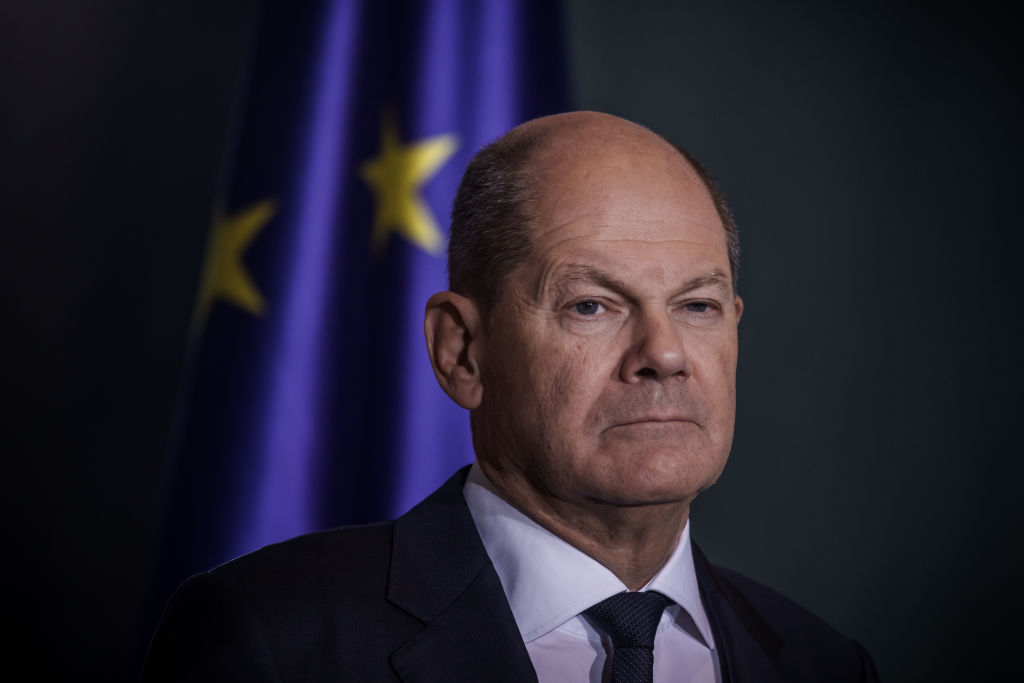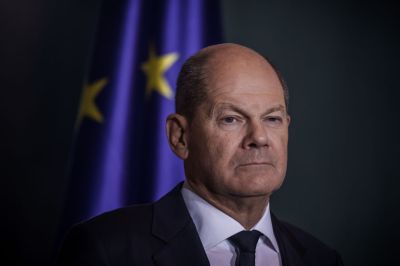The Israeli diplomat Abba Eban once quipped, “Nations behave wisely when they have exhausted all other options.” No other statement from history can better describe the German government’s sudden decision to deliver Leopard main battle tanks to Ukraine. After months of hesitation—more like borderline resistance—Chancellor Olaf Scholz has finally agreed to send the Bundeswehr’s most powerful tool to the aid of the embattled Ukrainians, but only after facing increased pressure from other NATO allies.
The German chancellor had indeed exhausted all other options—or excuses. Scholz first claimed that he would not do it unless there was international support—so Poland, Finland, and the United Kingdom all pledged to send tanks of their own—yet Scholz ignored them. Then Scholz hid behind the fact that the major German arms conglomerate Rheinmetall said it couldn’t supply Leopard 2 tanks until at least 2024. Finally, in the most farcical of excuses, the German leader claimed to have met a Polish jogger who told him he was afraid that sending Leopard tanks to Ukraine would cause an escalation in the war—so he could not send them.
The effort Scholz put into not delivering tanks—and not allowing other nations to send their Leopards—would have been laughable if it weren’t so concerning. Yet, now that he has finally come around, he will be lavished with praise. Praise that, frankly, is unwarranted: While he dithered, Ukrainians senselessly died on the battlefield.
Western European media outlets and a steady stream of politicians are already congratulating Scholz for his decision, often awkwardly avoiding the long road that it took to get there. This is especially true of German media, which has treated the issue as being a matter of strong resolve by the government.
Yet, all of this serves as another example of “West-washing”—the astonishing ability of the West to celebrate doing the bare minimum while innocent Ukrainians continue to die. From the very beginning of the war, Western European media outlets and self-congratulating politicians have flattered themselves by pretending to have accomplished something by doing less than Central and Eastern European nations and the United States have already done.
When French President Emmanuel Macron finally announced major arms transfers half-way through last year, rather than facing criticism for failing to do so sooner, he was praised. Macron had given in to fearmongering rhetoric by Russophiles in Paris for months. Instead of being challenged for taking too long, he was absolved.
The starkest example comes from the runup to the war. While the United States, Poland, and the United Kingdom rushed to provide arms, Germany ignored the pressure to make similar transfers. After much delay, the Germans sent 5,000 helmets. Kyiv Mayor Vitali Klitschko branded the move “a joke.” Yet Western European media puffed it up as a “historic shift in German policy.”
There is a pathological inability for many in Western Europe to truly understand just how out of touch they look when they take credit for such small acts that should be considered the bare minimum. In the best cases these leaders look naïve, and in the worst cases they look comedic. As the prime ministers of Poland, the Czech Republic, and Slovenia headed to Kyiv in March of last year for a symbolic first visits to the city, France’s Macron published a series of pictures of himself unshaven and scruffy looking, as though this made him look like a wartime leader. (At least the Wall Street Journal asked if he was trying to look like Volodymr Zelensky.).
At the same time, governments in Central and Eastern Europe have quietly been getting on with the job at hand and skipping grandiose statements about their contribution to Ukraine’s victory in the war. Estonia for example, a country that shares a direct border with Russia, has contributed the equivalent of 1 percent of its total GDP to military aid. Poland, a key ally of Ukraine from the start, has not only sent military aid but has taken in more than 2 million refugees and found homes for them among their own people. That figure amounts to about 10 percent of its total population. With little fanfare, the Czech Republic has transferred fleets of attack helicopters and offered a large number of their own tanks.
These countries in Central and Eastern Europe have in many ways put major European countries like France and Germany to shame, not just based on their transfers of military equipment, but on the basis of their humility in doing so. Their quiet commitment to the cause of freedom in Ukraine, and to NATO in general, is worth far more praise than the blatant “West-washing” of other European nations.






Please note that we at The Dispatch hold ourselves, our work, and our commenters to a higher standard than other places on the internet. We welcome comments that foster genuine debate or discussion—including comments critical of us or our work—but responses that include ad hominem attacks on fellow Dispatch members or are intended to stoke fear and anger may be moderated.
With your membership, you only have the ability to comment on The Morning Dispatch articles. Consider upgrading to join the conversation everywhere.